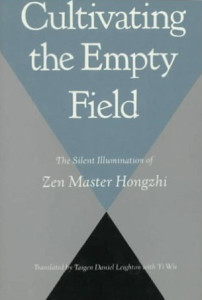Daily Dharma
Those who donated to our crowdfunding Indiegogo campaign last fall are getting daily e-mails this month as a thank-you and part of the May Sit. We wanted to share these with everyone, though they are a day or so later. This was the May 16 offering.
The first text in italics is from Cultivating the Empty Field by Zen Master Hongzhi, translated by Taigen Daniel Leighton with Yi Wu. The commentary following it is from one of the teachers at Dharma Rain Zen Center.
 In the wind abode clouds and dragons harmoniously follow each other. Very naturally from the first they do not need to express their intentions to each other. Similarly, patch-robed monks are accommodating and, based on causes and conditions, can harmoniously practice together. Arriving without display, emerging unconcealed, the wondrous [clouds and dragons] enter the whole scene and cannot be confused. Casually hanging above the ten thousand features, each distinctly presents a spectacular image. Complete without a hair’s difference between them, springing forth with spontaneity, they clearly exemplify coming home, but still must investigate until they have eaten their fill. Clouds disperse and winds die down. The autumn sky clears and the moon sets. The waters of heaven are limitless. Where the ground is on its own, the brightness begins to be realized.
In the wind abode clouds and dragons harmoniously follow each other. Very naturally from the first they do not need to express their intentions to each other. Similarly, patch-robed monks are accommodating and, based on causes and conditions, can harmoniously practice together. Arriving without display, emerging unconcealed, the wondrous [clouds and dragons] enter the whole scene and cannot be confused. Casually hanging above the ten thousand features, each distinctly presents a spectacular image. Complete without a hair’s difference between them, springing forth with spontaneity, they clearly exemplify coming home, but still must investigate until they have eaten their fill. Clouds disperse and winds die down. The autumn sky clears and the moon sets. The waters of heaven are limitless. Where the ground is on its own, the brightness begins to be realized.
According with emptiness requires a profound mode of renunciation. But as Hongzhi so artfully describes with this verse, this renunciation is effortless, nimble and spontaneous. When we initially imagine a deep giving up, we may think of it as something heroic: a wrenching, ripping, obvious giving up of who we are, and what separates us, in one fell swoop. But its not so melodramatic. Nothing’s static and the mind that imagines a final giving up is secretly grasping at something permanent. Dragons and clouds epitomize unhindered fluidity. They accord with conditions which change moment by moment. They accommodate every little change in pressure or temperature, shifting shape and movement to match. Their response is immediate, without deliberation, without explanation, without hindrance. When we can do this, both daily activity and meditation are more rewarding. Look for a moment of hardening today – when you hold yourself apart from your unfolding experience, and try to soften like one of Hongzhi’s dragons, allowing the moment to be just as it is. Then, notice and appreciate the spreading sensation of harmony.
